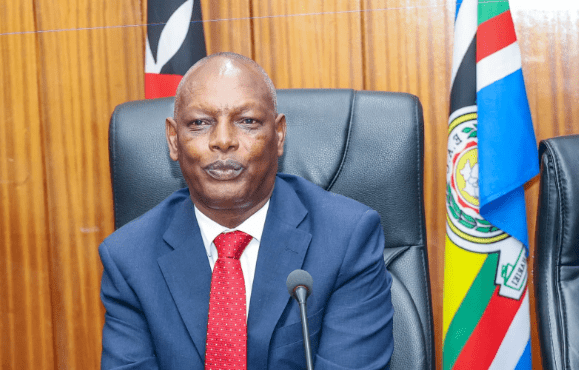Cracks emerge over promotion, hiring of police

Inspector General of Police Japheth Koome’s decision on promotion and recruitment of officers has put him on collision course with his employer, the National Police Service Commission (NPSC).
Commission now accuses IG of usurping its human resource functions.
NPSC commissioners, while appearing before the National Assembly’s Constitutional Implementation Oversight Committee (CIOC) on Tuesday, said in their endeavour to execute their mandate, faced several challenges and impediments, including the IG’s refusal to implement their decisions.
NPSC chief executive Peter Leley and his members met the committee to highlight its progress in fulfilling its mandate as outlined in the Constitution, enabling legislation and developing regulations and policies.
Commission maintained that Koome was subordinate to NPSC and should fully comply with the legal policy, and institutional regulatory framework guiding the team’s human resource functions.
Commission’s major grievance is that Koome has single-handedly made decisions on appointment and promotions without involving them. By virtue of his position, IG and his deputies are members of the commission.
“The Inspector General of Police has severally cited Article 245(4) of the Constitution as the reason for not implementing decisions of the commission on recruitment, appointments, confirmation in appointments, dismissal, transfers and promotions,” the commission told the House team.
Commission further noted that Koome’s actions had resulted into numerous irregular and unprocedural decisions with ethical, legal and public finance management implications. Some commissioners claimed Koome was dishing out promotions to cronies without following any competitive criteria and without determination by the commission.
They accuse him of exploiting a provision in the Constitution that requires him to run the commission “independently.”
“He is colluding with PSC staff deployed illegally by Interior Ministry without due process by commission in HR, PFM, and administration to mismanage payroll and confer benefits unfairly from irregular promotions,” one of the commissioners who sought anonymity said.
According to NPSC, the ‘commission’ referred to in Article 246(1) whose functions are stipulated in 246(3)(a) is not a person but a civilian authority to which National Police Service is subordinate.
Under Article 246(3), the functions of the commission include to “recruit and appoint persons to hold or act in offices in the service, confirm appointments, and determine promotions and transfers within the National Police Service.”
Article 239(5) stipulates that the national security organs are subordinate to civilian authority.
Performance contract
Commission also told CIOC that perception of the office of the IG as being independent has affected his performance.
“This will at the long run affect service delivery for the citizen and may prolong the time he takes to settle down.
The commission, thus, recommends implementation of a performance contract and evaluation for officers of senior ranks on HR related matters,” NPSC recommended.
NPSC said the perceived overlapping mandates was as a result of wrong and selective interpretation of the Constitution.
The Constitution expects the IG to exercise independent command over the Service. Article 245(4) states that the Cabinet Secretary responsible for police services may lawfully give a direction to the IG with respect to any matter of policy for the service.
Constitution further states that no person may give a direction to the IG with respect to investigation of offences, enforcement of the law against any person or the employment, assignment, promotion, suspension or dismissal of any member of the service.
NPSC, however, maintained that the “no person” envisaged in Article 245(4) is in reference to Cabinet Secretary. “The CS may give instructions to IG but not on matters that are a reserve of the commission,” Leley said.
Commission has now warned that HR management decisions made by the Inspector General for officers and civilian members of staff without determination and its approval are unethical, illegitimate and vulnerable to litigations and subject to financial management discrepancies in audit queries, employees’ pension and psychosocial wellbeing of the police officers.
“Any interference with the payroll management and administration without commission approval is contrary to Leadership and Integrity Act 2012 and Article 10, 232 of the CoK on values and principles of good governance of public service,” NPSC noted.








